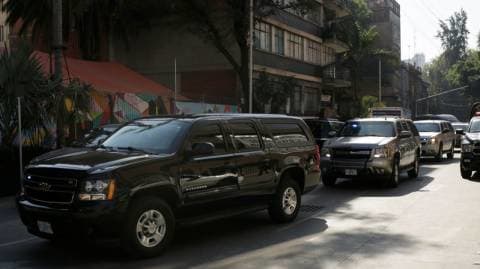
MEXICO CITY (Reuters) - Mexican President Andres Manuel Lopez Obrador said he and senior government officials had a "good meeting" with U.S. Attorney General William Barr on Thursday about the threat of Mexican drug cartels.
Barr met various senior officials after U.S. President Donald Trump said last week he would designate the drug gangs as terrorist organizations in response to a series of bloody security breaches triggered by cartel gunmen.
"As a lawyer, he understands our constitution obligates us to adhere to the principles of cooperation for development and non-intervention in foreign affairs," Lopez Obrador said of Barr on Twitter. "In this way we will always be able to work together."
He did not provide more details.
Tensions over the cartels intensified last month when suspected cartel hitmen massacred three women and six children of U.S.-Mexican origin in northern Mexico.
Lopez Obrador told a regular news conference ahead of the talks that they would focus on bilateral cooperation, and that officials would review a document that would serve as a point of reference.
The two sides discussed their security priorities and among other topics, they "talked about cooperation in arms trafficking, money laundering, international drug trafficking and how to deal with transnational crime and international drug trafficking," Mexico's foreign ministry said in a statement.
The Mexican officials who met Barr and U.S. Ambassador Christopher Landau included Foreign Minister Marcelo Ebrard, Security Minister Alfonso Durazo and the head of the Navy Jose Rafael Ojeda.
The U.S. State Department said on Wednesday it was working with the Mexican government to identify the "appropriate tools" to help it tackle the threat posed by cartels.
Designating groups as terrorist organizations aims to disrupt the finances of suspected members and their supporters via U.S. sanctions such as asset freezes and travel bans.
While it would not directly give the United States authority for military operations in Mexico, many Mexicans are nervous Trump could use it as a pretext for intervention.
Lopez Obrador has attempted to pursue a less confrontational approach to the gangs and has rejected any intervention. He has held out the prospect of cooperation with the United States but says his government has the wherewithal to tackle the problem.
(Reporting by Daina Beth Solomon and Dave Graham; Editing by Steve Orlofsky and Grant McCool)